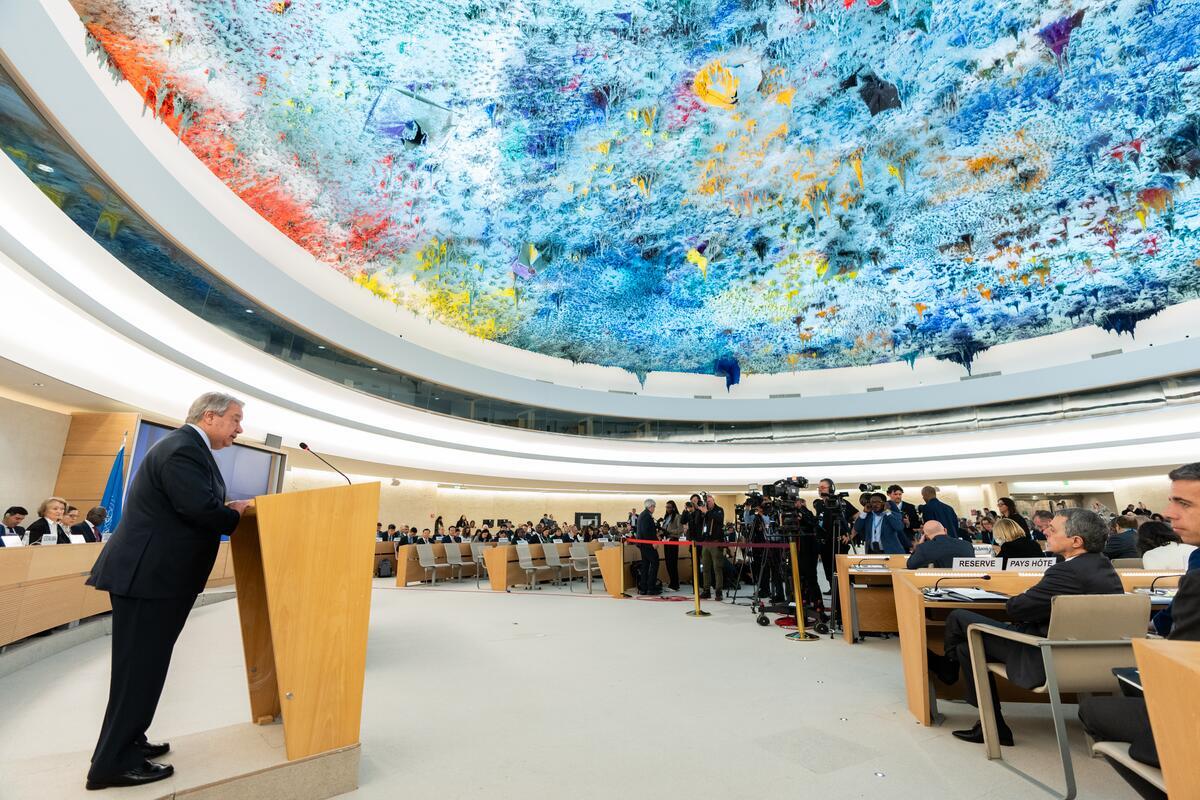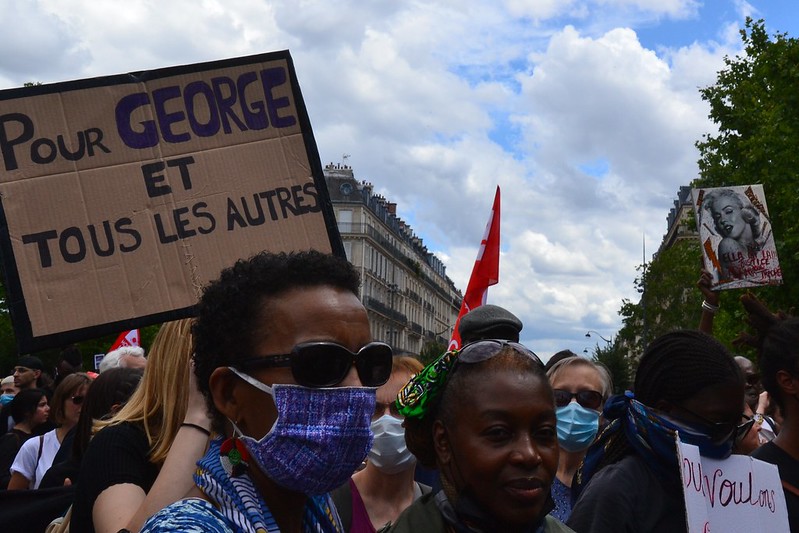On 15 November 2022, during one of the CERD sessions, Assa Traoré, Adama Traoré’s sister, travelled to Geneva to attend the review of France by the CERD. She spoke at the meetings with NGOs and CERD members and published on social media an extract from her speeches.
Assa Traoré is a prominent woman human rights defender and founder of ‘La Vérité pour Adama’. She has been campaigning for years for truth and justice for her brother, Adama Traoré – a French Black man killed in police custody in 2016. She has faced judicial harassment for campaigning for a transparent investigation to establish the responsibility of the gendarmes for the death of her brother and for them to be brought to justice.
In 2020, ISHR submitted a joint report along with Comité Adama, drawing the UN High Commissioner’s attention to police violence that caused the death of Adama Traoré in France in 2016. It notably aims at highlighting the racially charged police violence and the judicial irregularities which usually surround the case. The case was featured in the High Commissioner’s reports.
During the CERD sessions, some members of the Committee expressed their concerns over racial profiling and excessive use of force by police and other law enforcement personnel that resulted in numerous victims. Some others evoked Adama Traoré’s case, while asking about accountability and transparency. Diaby asked about the status of the investigation into the Adama Traoré case and whether the perpetrators had been arrested and/or convicted.
Reprisals against Assa Traoré
Since her participation – and because of this participation – in the CERD review of France, Assa Traoré has been facing intimidation online by right-wing extremist groups and the police union. On 18 November 2022, the Syndicat des Commissaires de la Police Nationale (SCPN) tweeted and commented on an article published on the website of the right-wing media Valeurs actuelles entitled: ‘Assa Traoré spoke at the UN to criticise France and the French police’, with a photograph of Assa Traoré’s face to illustrate the article. The SCPN posted, on its public Twitter account, followed by more than 23,000 people, the following press article: ‘This person represents no one but a family criminal clan. The UN is not honoured by giving a platform to this lying, radicalised activist who spits on the [French flag]’. A similar statement was also pronounced by the Syndicat France Police, declaring that Assa Traoré, part of the ‘gang Traoré’, spoke at the UN to ‘puke on France and the police’.
This online intimidation is a reprisal for Assa Traoré’s work and specifically her engagement with the CERD, with the aim of intimidating her and dissuading her from testifying at the UN. This is not an isolated incident since it occurs in the context of judicial harassment against Assa Traoré since 2019. The French authorities are attempting to criminalise her and discredit her fight for justice for her brother, mainly through lawsuits that are being used to divert the public attention from the justice that is expected for her brother’s death but also to dissuade her from continuing her struggle. To this day, there has been hardly any progress made after five years toward the trial of those involved in her brother’s death.
The targetting of Assa Traoré, a family member of the victim of racially motivated police brutality, has a considerable adverse impact on all other families who wish to speak out and seek justice for the crimes and violence committed by the police. The UN Special Procedures have issued several communications in this regard.
It is important to recall that the UN Declaration on Human Rights Defenders reaffirms the right of everyone, individually and in association with others, to unhindered access to and communication with international bodies, in particular the United Nations. In a joint statement of Treaty Bodies, including the then CERD Chairperson and the Special Rapporteur on human rights defenders, on the occasion of the 20th anniversary of the Declaration, Treaty Bodies reiterated ‘the importance of human rights defenders being able to act freely and without any interference, intimidation, abuse, threat, violence, reprisal or undue restriction’.
ISHR alerted the CERD and relevant UN Special Procedures urging them to seek from the French government effective measures and guarantees that in all circumstances, human rights defenders in France can engage safely and effectively with the UN, without intimidation or fear of reprisal including by carrying out prompt and effective investigations into the defamation against Assa Traoré for her participation in the CERD and holding the Director of the publication of the SCPN Twitter account accountable.
ISHR also alerted the French government urging it to take effective measures to guarantee Assa Traoré’s safety and ability to carry out her legitimate human rights work in a safe and enabling environment.
Impact of ISHR’s intervention
On 25 November 2022, the CERD’s Chairperson wrote a letter to France referring to the information received by the Committee on 23 November 2022, regarding worrying information concerning a series of messages spread on the Internet against Assa Traoré following her cooperation with the Committee on 15 and 16 November 2022. In this letter, the Committee raised concerns about the defamatory online messages aimed at denigrating Assa Traoré and delegitimising her actions as well as her request to clarify the circumstances of her brother’s death. It also added that it was even more concerned about the fact that some of the messages had allegedly been posted on the accounts of law enforcement unions. The Committee argued that these messages and the circumstances in which they were published by law enforcement unions may constitute intimidation against Assa Traoré and could have a chilling effect on those who report acts of racial discrimination and seek to cooperate with the Committee.
The Committee reminded France, a State party to the Convention, of its primary obligation to take adequate measures to prevent and respond to all forms of intimidation and reprisals against individuals and groups who cooperate with the Committee. It also requested France to make an assessment of the information brought to its attention in order to take adequate measures to prevent and respond to any act of intimidation or reprisal against AssaTraoré.
On 12 January 2023, France responded to the CERD’s letter. The State party thanked the Committee for its alerts concerning the defamatory messages posted on social media against Assa Traoré. It declared that it was taking these alerts into consideration and fully confirmed CERD’s right to exchange with members of civil society in the framework of the United Nations’ human rights mechanisms. The French authorities reiterated their full determination to prevent and respond to all forms of intimidation and reprisals against any person cooperating with the UN mechanisms and being attentive to the personal safety of Assa Traoré and her family. They also mentioned that the Paris prosecutor’s office had opened a criminal investigation regarding the matter.
On 14 December 2022, the CERD published its final observations regarding France’s review. It reiterated its grave concerns regarding the intimidation and threats faced by human rights defenders, in particular when cooperating with the Committee, which ‘impedes its effective functioning’. The Committee mentioned the defamatory messages and online threats – in particular on police union social media accounts – faced by Assa Traoré. It requested France to ‘take immediate and effective measures to ensure the safety of Assa Traoré, to take disciplinary measures, to conduct the necessary investigations and, where appropriate, to initiate criminal proceedings against the public officials involved in these intimidating and threatening messages’. It also recommended the government take the necessary measures to protect all human rights defenders from threats and reprisals.
Additionally, the CERD reiterated its deep concerns regarding a number of reported cases of excessive use of force and ill-treatment – including physical and verbal abuse – by law enforcement officials on members of certain minority groups, in particular persons of African descent, persons of Arab descent, Roma, travellers and foreigners. The Committee noted with concern the case of Adama Traoré, a young man of African descent who died in 2016 following his arrest by the gendarmes, the cause of which is still being determined. Therefore, the Committee recommends France conclude the investigation into the death of Adama Traoré, so that those responsible are brought to justice and punished appropriately.
Judicial harassment of Assa Traoré continues
The Paris Court of Appeals condemned Assa Traoré for violating the presumption of innocence of the gendarmes by claiming that they killed her brother Adama on 19 July 2016. The verdict requires her to delete the relevant Facebook publications and to publish this decision of condemnation on the Facebook page “La vérite pour Adama”. It also ordered her to pay the military 6,000 euros in legal fees and 6,100 euros for the delay in publishing this statement. In total, she is required to pay 12,100 euros to those who caused the death of her brother. It is important to recall that the gendarmes are yet to be indicted. The judgment is final and cannot be appealed.
In this video, Assa Traoré explains how she has been condemned by the Paris Court of Appeals for violating the presumption of innocence of the gendarmes when she claimed that they killed Adama on 19 July 2016.
ISHR urges France to:
- Take effective and immediate measures to fully implement the recommendations by CERD
- Undertake a serious review of police practices to limit the excessive and disproportionate use of force
- Take steps to effectively address harassment, online defamation, and invasions of privacy of victims of police violence and their families, including ending the practice of first digging up the criminal records of victims of police violence or their families and/or presenting the criminal history of victims as a possible justification for their deaths or injuries at the hands of the police
- Break the dependency between the Public Prosecutor’s Office and the Ministry of Justice so that the latter cannot interfere in the investigation of police violence
- Support the work of defenders fighting police violence
- Put an end to judicial harassment against defenders working on police violence, including an end to unfounded or abusive prosecutions and intimidation (e.g. surprise searches) against them
- Take measures to effectively combat harassment, online defamation and attacks on the privacy of defenders working on police violence
- Raise the profile of the work of defenders working on police violence by, among other things, making available in all police stations and other relevant public places a public and easily accessible list of all organisations working on the issue, including those providing legal assistance to victims.
Download as PDF




